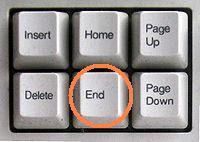
Whether we are purchasing something online or we are signing up for new or existing Email Address, a password is usually required. In today’s increasing online world, having a strong password is a must. With more and more services being added everyday, it can sometimes be hard to come up with new passwords to use. So, I thought I would take some time today and try to provide some light on creating a safe & strong Password.
According to security experts, there are 9 rules one should follow when making up passwords.
Password: EXAMPLEPASSWORD
is not the same as:
Userid: exampleid
Password: examplepassword
You must enter your password in the same case as you have done originally.Often we experience the inability to log into a case sensitive login because the caps lock key is on causing the case sensitive password and/or username to fail.
9.Alter the Passwords you currently use by adding a meaningful symbol is one step toward making them difficult for Internet thieves to crack.
Example:
1. Your son’s initials are SON
2. Your daughter’s initials are DAU
3. They were born in 1981 and 1983, respectively
Potential password: Son81>83Dau
Further requirements for a strong password:
* Spell letters phonetically: the initials ABO can become AyBeeOh
* Use both upper and lower case letters
* Use at least one number
* Do not begin or end the password with a number
Practice your new password in your word processor and get it to flow smoothly off your fingers
If we follow these nine simple rules, we'll have the most secure and strong Passwords. I strongly suggest that you stop everything, go, right now, and change your banking and any financially sensitive passwords. Other types of passwords can wait. Do it now, before you forget.
According to security experts, there are 9 rules one should follow when making up passwords.
- Password should be random. By that, I mean you should choose a series of characters that are completely random to everyone else, but make complete sense to you. For example, the more easy you make it for you to remember the password, the easier it will be for a hacker or other undesirable person to steal it from you. Furthermore, the longer it is, the harder it will be to crack.
- Passwords should be unique. Create a password that no one else will be able to easily guess.
- Each password should be, at the very least, eight characters long, but the longer it is, the better. If you can come up with a password that's 14 characters or more, go for it!
- Password should be a combination of upper and lowercase letters and there should be at least one number or symbol included somewhere. The more variety you add to your password, the better it will be.
- Password should be changed regularly and frequently. The longer you leave the same password in place, the easier it will be for a hacker to grab it.
- Type your password manually each and every time you're asked for it. Yes, the "Remember Password" feature is nice, but it's really best to enter it in each time.
- NEVER use your first name, last name or login as your password.
- Case Sensitive password is always preferred. Examine the following userid and password:
Password: EXAMPLEPASSWORD
is not the same as:
Userid: exampleid
Password: examplepassword
You must enter your password in the same case as you have done originally.Often we experience the inability to log into a case sensitive login because the caps lock key is on causing the case sensitive password and/or username to fail.
9.Alter the Passwords you currently use by adding a meaningful symbol is one step toward making them difficult for Internet thieves to crack.
Example:
1. Your son’s initials are SON
2. Your daughter’s initials are DAU
3. They were born in 1981 and 1983, respectively
Potential password: Son81>83Dau
Further requirements for a strong password:
* Spell letters phonetically: the initials ABO can become AyBeeOh
* Use both upper and lower case letters
* Use at least one number
* Do not begin or end the password with a number
Practice your new password in your word processor and get it to flow smoothly off your fingers
If we follow these nine simple rules, we'll have the most secure and strong Passwords. I strongly suggest that you stop everything, go, right now, and change your banking and any financially sensitive passwords. Other types of passwords can wait. Do it now, before you forget.







